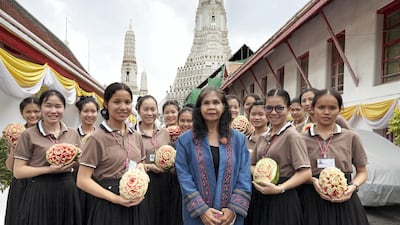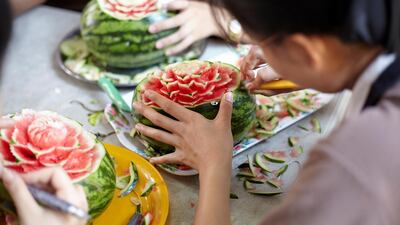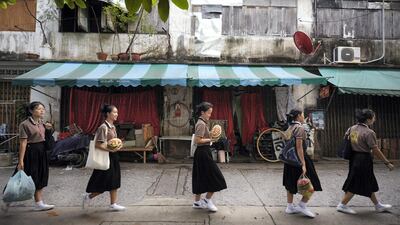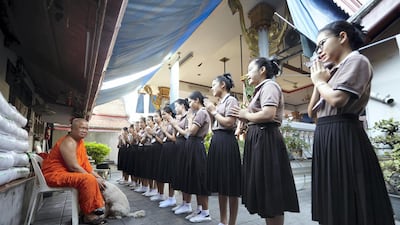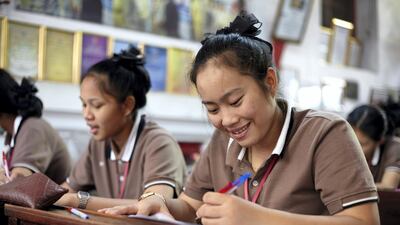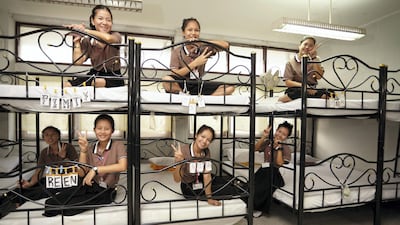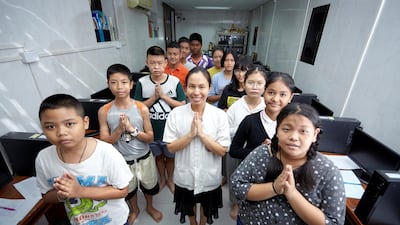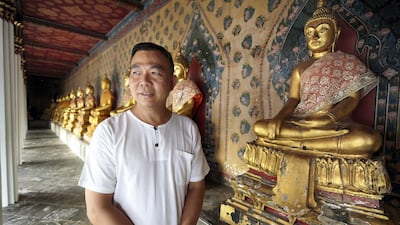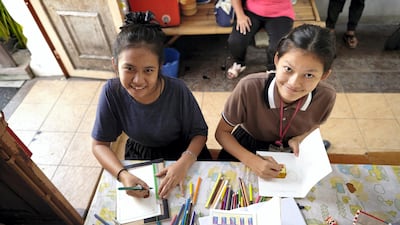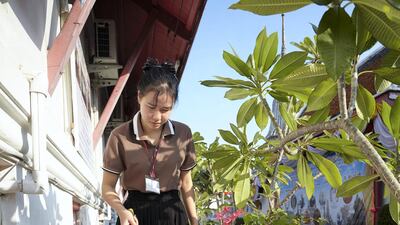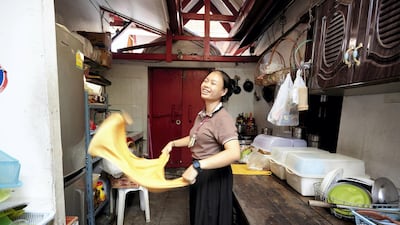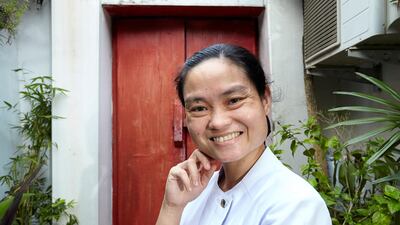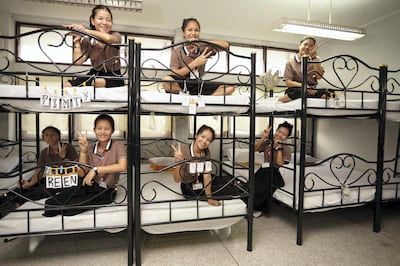Natisha, 19, is scarred by the repercussions human trafficking has had on her family. The young villager's older sister was duped, like many, into working in Bangkok – sold the dream of a better life, a salary and freedom to experience the excitent of the big city, but instead forced into a life of servitude and sexual abuse. Natisha saw her sister suffer from mental health problems after she'd escaped, Natisha knew she had to follow a different life path.
When we meet her in Thailand, she has a visible air of insecurity, her physical demeanour belying the brave step she took to leave her home in search of a better future. After the horrors of losing one daughter to the traffickers, Natisha’s mother had banned her shy, softly spoken daughter from leaving their village in the remote Tak province. The mother of six naturally wanted to do all she could to keep her children close. But then Natisha was accepted on to a community learning centre programme based in Bangkok’s royal temple, Wat Arun. Natisha knew it could be the answer, but leaving the tiny village, which is home to about 50 families, for the capital, was no small feat for someone who had never had electricity or been near busy roads. Yet she knew she had to go: people around her were being trafficked, and many others were addicts, selling drugs or forced to marry young and left with no real future.
Being able to work safely and without exploitation may be something many of us take for granted, but, in Thailand, human trafficking is a stark reality for a large number of its young women, not least those in the rural communities, which amounts to about 65 per cent of the country's population. That's why the programme at Wat Arun, which was founded by Indonesian businessman-turned-monk Hartanto Gunawan, takes in a handful of at-risk girls every year. It allows them to enter a nursing training programme and is an anti-human trafficking initiative with the attitude that prevention and intervention are the best cures. We spend 10 days with the women there, and quickly find that these are no ordinary teenagers.
A new dawn
As Natisha shares her story with us, we notice a real purity in the way she speaks, an innocence only a villager, untainted by the teenage distractions of city life, could possess. Her voice is soft, but she speaks to us with determination, as if it is her duty to tell the truth.
Wat Arun means Temple of Dawn, and what it offers truly is the dawn of a new life for the girls who make it on to the course. More than 100 apply for the 15 to 20 places available per year. Although it’s intense, consisting of 365 consecutive days of work and study, they have the guarantee of a job as a nursing assistant, with a monthly salary of about 12,000 baht (Dh1,200), plus accommodation, at the end of it all. This is all supported by generous philanthropists at home and abroad. Over the years, these have included private individuals, diplomats and US-based organisations the Virginia B Toulmin Foundation and the JWS60 Foundation.
In Natisha’s home village, 12,000 baht is a very liveable salary, as the community lives off the land. Her family grows rice, vegetables and chillies, and in such communities, neighbourly exchanges of goods is a means of survival. What she learns on the Wat Arun programme not only helps her, but her family, too.
“With these girls, it’s only a matter of time,” says Gunawan. “If they aren’t taking drugs themselves, they’re being drugged, abused at home and are vulnerable to human trafficking at any time.” Many of the girls are born to addicted parents or are surrounded by a culture of addiction in the community, if not at home. However, with a success rate of 97 per cent, the temple programme is now recognised as the world’s most successful prevention and intervention initiative by the United States State Department, which awarded the centre’s efforts in 2016.
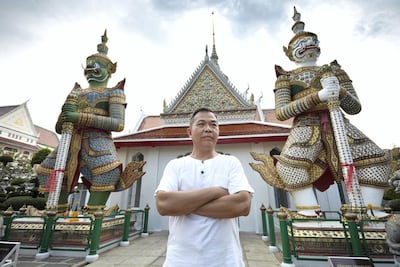
From chief executive to monk and teacher
It is a passion project now in its 14th year for Gunawan, 54, who 21 years ago, quit his job as a successful chief executive of a multi-industry holding company in Jakarta, to move to Thailand in order to fulfil his mother’s request that one of her five sons becomes a monk. The move would become the start of a personal and professional transformation for the US-educated man who had everything. He belly laughs now as he recalls the first two tortuous years of his monk initiation, which would see him living alone on a wild jungle island off the coast of northern Thailand, with nothing but an umbrella to fend off the relentless tropical rains and his Buddhist texts to pass the days. “I cried every day”, he says with a smile. Gunawan, each day, would wait for a fishing boat to pass by, to take him to shore to beg for alms. But sometimes, there would be no boat. Instead, he’d sit meditating, surrounded by snakes and scorpions, which were often crawling on his body and face. He often wondered if he had been forgotten by those who had sent him for his ordination. Ultimately, it was a journey that would brutally tear him out of a life of opulence and put him on to a new path. When he had completed a further two years as a monk back on land in northern Thailand, he realised his calling was to take the teachings and use them for the good of the world. That’s how he came to establish the Wat Arun learning centre, which began with a few members of the community learning philosophy and English language with Gunawan under a tree in the temple grounds.
Today, he teaches what he calls "research meditation". Rather than simply concentrating or quietening the mind, he says it must be used for self-enquiry: to understand who we are and why we're here. "A terrorist or criminal can have a concentrated mind and still pull the trigger," he explains. "So a concentrated mind can still be very dangerous." The philosophy he teaches, uses the Buddhist way of living, known as Dhamma. At its most basic, this means no killing, no stealing, no adultery, no lying and no consumption of intoxicating substances, but it's much deeper than that, as the girls also study the ancient texts and chant them daily, delving into complex concepts such as the law of impermanence and the law of karma.
While working in the corporate world, Gunawan had a blood pressure of around 200-220, constant headaches and a turbulent temper – that's hard to believe when we meet him now. His presence is calming and nurturing. Today, his life is simple, his blood pressure low, and his mood and smile always warm. He sleeps roughly four hours a night, he gets up at 4am every day to meditate, but still constantly works to manage a programme through which peoples' lives depend on him. He eats one meal a day, as he has done for the last 21 years, and lives in a two-by-four-metre room at the temple, sleeping on the wooden floor, commonly bitten by termites and scorpions that creep in. Yet, Gunawan has never looked back on the life he left behind. This anti-trafficking and abuse activism is a long way from his former life of indulgence and wealth. "Saving one life is worth everything," he says.
Life at the temple
Indeed, through his project, Gunawan has saved the lives of many girls. Most in the temple compound are 18 or 19 years old, coming to the project after they finish their state-funded high schooling. Their daily lives are run almost like a military operation; it’s the only way to ensure they are able to live a responsible and sustainable life alone once they leave, says Gunawan. Each morning, they get up at 4am from their long room lined with tired bunk beds to chant the Buddhist teachings and meditate, before they begin their study or work programme. They have a uniform for everything, from their pyjamas to what they wear to work. Clothes are hung together at each end of the room while stacked storage boxes that hold their few belongings ensure there is order in the sleeping space; there’s no mess, not even a pillow out of place. While the dorms are simple, they are safe, and for many of these young ladies, it’s an abundant life compared to what they had at home, where many had to walk for water, live by candlelight after dark and go to sleep hungry. Here, every day they sit down to plentiful meals, eating with enthusiasm. Nothing goes to waste.
For the first six months of the year before they go on placements around the country, the girls study English, IT, meditation, philosophy and go to compulsory cultural classes, such as fruit carving and Thai dance. They clean and do duties at the temple each day, offer alms to the monks each morning at the dormitories and participate in community service. Each job has a schedule, which changes daily, allowing each girl to do every job, ensuring fairness. This includes everything from preparing food to cleaning the bathrooms, and everyday, a group leader is assigned to take charge, developing leadership skills and confidence.
The girls are incredibly well behaved considering they are teenagers. There’s no screaming, giggling, loud music or noise. They even (mostly) obey the 10pm cut-off for phone usage. Although we don’t speak the same language, we spend time bonding over Google Translate, sharing photos of our lives and communicating with the minimal English they are confident enough to share. They tell us about their day at work, their dreams. They know how to ask how much things cost, acutely aware of the value of money.
Nobody is ever late as we make our way downstairs to meditate in silence at 4.15am each day. When we arrive, the books and cushions are all laid out in perfect order, ready for us to start as soon as the last one takes her seat on the floor. As we take the short walk from the dormitories to the temple, the girls are dressed up smartly in their uniforms, hair all tied up in place in the same style of bun. They greet everyone along the way with hands joined and bowed heads, the traditional Thai greeting or "Sawadee". They give away food and toys donated to them to children in the nearby neighbourhood with beaming smiles and loving hearts.
A pressure to provide
Many of these girls are breadwinners. Fa, 19, has only her mother. While we are there, she fails her exams. She sobs and tells us about "the pressure" she feels, as her mother depends on her. It's in situations like this that traffickers are able to recruit; girls need to earn money quickly, they often don't have the luxury to study further and so it seems like a quick fix.
The annual donations the temple receives are critical and this is where Gunawan steps back into his business shoes to ensure not a single baht is missed. Each year, every girl needs about 120,000 baht (Dh12,000) to cover her essential travel and meals, raised via scholarships. During the six months of work placements, the girls have an allowance of about 120 baht per day, out of which they have to travel to work, eat and set money aside to prepare them for their first month of working without salary or family to support them. This is when they begin to learn the value and management of money. Those who have to go to hospitals in more remote locations have even less money to play with, so even their allowance is not enough, but it’s all Gunawan can afford to give.
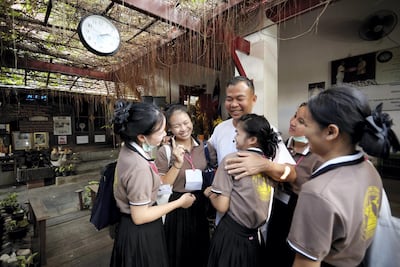
Tam, 31, from rural Chiang Rai province, was in the second batch of students who graduated in 2008. She was orphaned by the age of 5, but under Gunawan's tutelage, she was able to win a scholarship to study a nursing degree in Taiwan on the condition she learnt fluent Mandarin, which she did. Only five of the 250 girls across the 13 years of graduates so far have continued to study the full four-year university-based nursing qualifications. That's mostly because the priority is to work and support their families as soon as they graduate from Gunawan's programme. He calls those who continue "the very determined ones".
Though he has no children of his own, all 250 girls who have been through the programme call Gunawan "khun pur", which means father, but to Tam, this could not be more apt. Her grandmother died just three months into her starting the Ministry of Education-accredited programme, so she had nobody but him. "Khun pur became my family," she tells us, as she recounts her daily routine, which consists of working at one of Bangkok's private hospitals, Samitivej, and attending to her temple duties before and after work. She still lives in the dormitories in which she was once a student, although has her own small room now. One-third of her monthly 30,000 baht salary goes to the temple, another third to her savings and the rest to her living costs. "This centre is so important for the future of the girls, just like it changed my life," she says.
"She has no family, so I wanted to help her build her future," says Gunawan. He raised funds to travel with her to the National Taiwan University of Science and Technology, to ensure she was safe. "We can't be careless. Better to spend the money and be safe rather than sorry. The father's role is usually to go out and provide, while the mother's duty is to worry and care for the children. Here, I do both, along with being boss and teacher."
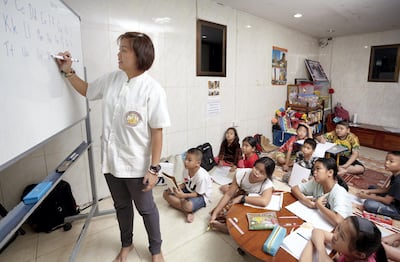
A pillar in the community
Aside from the nursing students, more than 60 other underprivileged children in the community study at Gunawan’s centre, in meditation, computer skills and English language. Som, 14, whose father abandoned her mother during pregnancy, has been learning from the man she calls “father” for almost 11 years, and although she lives nearby, she spends most of her time at the temple. Thanks to this, she now attends a private school and hopes to be a doctor.
Mayuree Kojirapan has been an English teacher in the programme for about 14 years, teaching both the girls in the nursing initiative, as well as the community classes, which start from age 7. The centre’s work is critical, she says, as the nursing students are extremely vulnerable. “In their villages, they don’t have many opportunities, but after they come here, their life changes. They learn to be independent, but not only that, are able to help their families.” The ripple effect is huge, she says with a smile. “Many do things like buy their family a home, help a family member to set up a business or to continue studying.”
It is now a lifelong mission for Gunawan, offering the students a viable way out of their poverty-stricken lives. "I won't be here forever, so, while I can, I want to plant as many good seeds as possible," he says. "We can talk about women's empowerment, but what we do is actual women's empowerment. We are not making presentations, or policies, we are providing for them, educating them and giving them tools to stand on their own two feet.
“When they put on this nursing uniform, it brings them respect from others, which in turns allows them to respect themselves. This, you cannot buy.”
